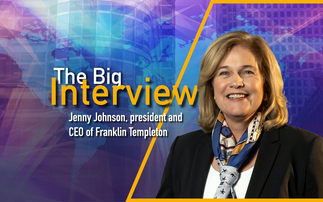Industry Voice: As we move into March, global stocks have enjoyed the best start to the year in almost three decades. Does this bode well for the rest of 2019? History suggests it does. Since 1928, a good January/February has led to a positive calendar year over 80% of the time. However, history does not always rhyme - especially in a post-2008 world. Our latest asset-allocation meeting was therefore a good opportunity to stand back and look at the bigger picture.
A bruising fourth quarter
Top of our agenda were the four ‘Ps': politics, policy, profits and positioning. Financial market prices move because of the balance between supply and demand. A number of factors can influence this dynamic, including economic trends, technical issues and investor sentiment. Take December. After a tough November, a classic year-end rally was forming in the run-up to Christmas. And then the wheels fell off. Investors took fright at the prospect of more aggressive Federal Reserve (Fed) monetary policy. Trade tensions between the US and China mounted. Many feared the manufacturing sector and global trade were headed for a mini recession. Concerns grew that this could broaden out to the wider economy. As a result, many institutional investors fled equities in favour of cash and other ‘safe-haven' assets.
No longer Fed up
But, as the New Year started, sentiment turned. Once again the Fed provided the mood music. Belatedly recognising the economic dangers ahead, the Bank announced that it was putting interest rate rises on hold. Other central banks quickly followed. Indeed, the People's Bank of China took steps to add liquidity to its economy. Meanwhile, the more stable US dollar gave emerging market policymakers some room to manoeuvre. Politics also played a role, as hopes reignited of a US-China trade deal.
Keep on running?
Can this positive mindset continue? We think so. Admittedly, global economic growth remains subdued. However, economists have increased their 2020 forecasts, spurred by an improvement in emerging markets. More accommodative policy is already feeding into improved financial conditions. A significant slowdown in corporate profits has been priced-in and better prospects lie ahead. The risk of a near-term policy error in 2019 - and consequent recession - has faded. Hence, asset prices have rallied strongly from their lows.
Where next on trade? US President Trump is now in full re-election mode. After he failed to reach a nuclear agreement with North Korea, he will be keen for a quick win to boost his ratings. Many think this could come in the form of an agreement on trade with China. His recent decision to postpone tariffs on $200 billion of Chinese goods is a move in the right direction.
Further out, we don't anticipate a global recession this year or next. While the effects of US fiscal stimulus are starting to fade, Europe and China are pressing the fiscal accelerator. The Fed may well start raising rates again later this year, though it is likely to adopt a measured approach. Meanwhile, a range of temporary and structural factors should restrain underlying inflation in the major economies. True, wages are finally rising thanks to a tight labour market, but companies are offsetting this with cost cuts and efforts to boost productivity. This includes increased investment in digital technology.
Corrections should be expected
Of course, it won't all be plain sailing. Last year was characterised by a couple of large share-price corrections. Given the current backdrop, we expect similar bouts of upheaval in 2019 and 2020. What could be the catalyst for these sell-offs?
Economics, for one. The Chinese government has taken steps to support the economy. Nonetheless, debt levels remain worryingly high. Business confidence has nosedived. This could limit the effectiveness of recent monetary easing. Further disappointments could therefore spook markets.
Trade will remain a factor. As we said, the US and China could yet strike a deal. However, there are concerns Trump could open up a new front in his "America first" agenda. Car exports from Europe would be a prime target. His recent decision to end India's preferential trade status surprised many. The likelihood of a showdown between the US and other nations is now a real possibility.
Populism to remain popular
We will also keep an eye on politics, especially the simmering tensions across Europe. Spanish voters go to the polls (again) in April, while EU parliamentary elections are in May. The success of populist parties in those elections could influence subsequent policy, including how the Commission negotiates with Italy over its massive debt pile. Populism will rear its head from time to time, as many voters continue to feel they have missed out on the benefits of structural reform and globalisation. Political discord is therefore understandable. Brexit is just another example of this phenomenon. All this could lead to periods of market disruption, adversely affecting cross-border capital flows.
Meanwhile, the Fed could raise rates more aggressively than forecast, putting renewed pressure on developed and emerging economies. This would again expose countries with high dollar-denominated debts.
Nonetheless, barring a major recession and as long as company profits remain on track, we think markets can recover from any setbacks. That said, in such circumstances, it is still important to adopt an active management approach. We will continue to look for diversifiers to safeguard our portfolios from undue levels of volatility. For example, last year we were overweight the Japanese yen. This is a classic ‘safe-haven' currency, ideal for when times get rough. Now, though, the yen is too expensive. In some portfolios, we prefer an overweight position in the US dollar versus the euro as a better way to safeguard our portfolios.
Finding value
On the whole, equity valuations look attractive - although we would advise caution. The key question is: what will release that value? In the UK, for example, equity markets have trailed their global equivalents, as Brexit uncertainty has taken its toll. As a result, many companies now trade at historically low valuations. Domestically focused stocks have been particularly unloved, as they are more susceptible to a material UK economic slowdown. However, the pent-up spending and investment could be quickly released should the UK achieve a ‘positive' Brexit. Such stocks could therefore rebound dramatically.
A world of low interest rates
Outside the US, interest rates should remain low. The European Central Bank is unlikely to raise rates before summer 2020. A ‘no-deal' disaster aside, forecasts are for the Bank of England to hike only once in the next 12 months.
In other words, investors will still have to hunt diligently for yield, preferably in a sustainable way. We wouldn't recommend buying yield for yield's sake. Investors must be confident in a company's management and strength of its business model before they invest in its debt. This includes the ability to service its debt under a range of possible outcomes.
Fine-tuning portfolios
As a result of our discussions, we have made modest changes to our asset allocation. Our risk level is largely unchanged, although it has been spread more broadly across global equities. We continue to like emerging markets, such as China, which made a strong start to 2019. We are also examining our positions in high-quality credit, partly for diversification and partly for carry purposes.
Looking beyond 2020
Given high levels of global debt, we are still analysing the possibility of recession in coming years. China remains a concern. The outcome of the US presidential election will be a major factor. For one thing, the result will dictate how the strategic rivalry between the US and China evolves. Regulatory oversight will also become increasingly prevalent, notably towards the technology sector. Government policies point to increased intervention and further regulation. This will have direct implications for economics and financial markets. It will also put pressure on companies at a time when they are dealing with disruptive new competitors.
Against this backdrop, we are maintaining moderate levels of risk. We expect to trade tactically through 2019, as the various markets price in more good and bad news. An understanding of valuation signals and investor positioning will therefore be just as important as corporate, economic and political influences in determining how to make money for our clients.
Capital at risk.












